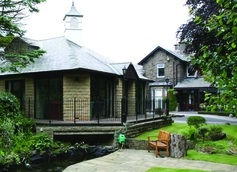Well Springs Nursing Home gets involved in innovative research projects to further study of dementia
Well Springs Nursing Home in Bradford is calling on other care homes to join the ENRICH network after seeing firsthand the benefits of being involved in other care home research projects.

Well Springs Nursing Home is part of the Enabling Research in Care Homes (ENRICH) initiative, a hub for care home related research.
ENRICH was launched earlier this year to increase participation in clinical research to 10 per cent of all NHS patients, as part of the Prime Minister’s Challenge on Dementia, and is part of the Research Ready Care Home Network, run by the National Institute for Health Research (NIHR) Dementia & Neurodegenerative Diseases Research Network (DeNDRoN).
Cath Davies, manager of Well Springs Nursing Home, says: “We have been involved in three research projects. The first was a telewound study where all the wounds were photographed with a camera and we sent all our reports through with a computerised pen. The study took six months and it was extremely beneficial. We had a gentleman who had a grade 4 pressure sore which hadn’t healed and the professor in charge of the study saw the photograph of the sore and came and did some in-house surgery. We found the technology was quite difficult to use so the researchers are refining the equipment.
“We were also involved in a delirium project which trained staff to recognise if a person with dementia was delirious as it can be quite hard to recognise if someone has dementia. We were also involved in a project on reducing hospital admissions.”
Some care homes can be put off, by the fear that the paperwork involved with the study, will be too onerous and increase staff workload. However Mrs Davies says: “The researchers from the projects are sent in to do most of the paperwork. We did find the telewound project more time consuming than the other project but then it proved to be so beneficial.”

She is a firm advocate of getting involved with research projects and says: “It is a good way of promoting the home.”
She has also found it is good for care home staff as “it expands their horizons” and “gives residents a chance to shape their future and the future of people who will come into care homes. The staff have also received free dementia training which is great so it has really opened doors for us.”
The Care Quality Commission also commented on Well Springs’ involvement with the research projects and said it was encouraging as it shows it is a home that wants to do well and is striving to do its best.
Before embarking on a collaboration with researchers, Mrs Davies recommends to care homes that they get a clear briefing of what the project is about and the time scale and how much time staff will be expected to put into the project.
Beverley Manzar, manager of Ebury Court Care Home in Essex is also a big fan of the ENRICH initiative. She has also been involved in three research projects and says: “I would definitely recommend other care homes to get involved in research as it is so useful both to our residents and to the researchers. Every research study we have got involved in has added something to the environment of our care home. The very act of trying to add something to the future is just so important.”
carehome.co.uk recently joined forces with the Research Ready Care Home Network to encourage more care homes to take part in research studies to improve the treatment and care of people with dementia.
Steve Iliffe, professor of Primary Care for Older People at University College London calls the ENRICH network the “missing link between the research community and the care home sector”.
BUPA Care Homes and Barchester Healthcare have already signed up to the initiative and the Network hopes to recruit hundreds more care homes in the coming months.
To get involved in research or be a part of the network of ‘research ready’ care homes visit www.dendron.nihr.ac.uk/enrich or email enrich@dendron.org.uk
Latest Innovative Care News
 13-May-19
'Pink drink' brain cancer treatment rolled out across NHS in memory of Baroness Jowell
13-May-19
'Pink drink' brain cancer treatment rolled out across NHS in memory of Baroness Jowell
 25-Apr-19
Louis Tomlinson helps 83-year-old who lost wife to dementia complete bucket list
25-Apr-19
Louis Tomlinson helps 83-year-old who lost wife to dementia complete bucket list
 22-Mar-19
UK's top care home handyman takes residents to pub for pie and pint
22-Mar-19
UK's top care home handyman takes residents to pub for pie and pint
 12-Feb-19
Michael McIntyre's jokes tested to see if they stop elderly catching flu
12-Feb-19
Michael McIntyre's jokes tested to see if they stop elderly catching flu
 07-Jan-19
'We were lucky to find it': Family's delight as care home is rated Outstanding
07-Jan-19
'We were lucky to find it': Family's delight as care home is rated Outstanding